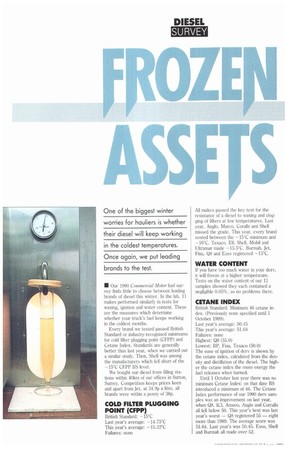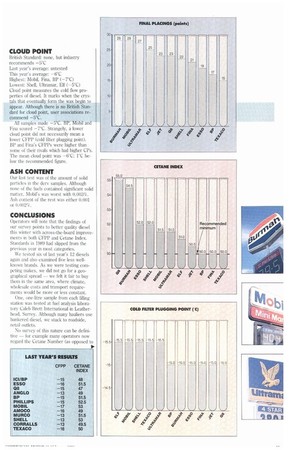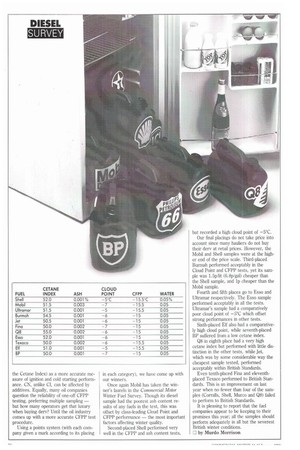ASSETS
Page 64

Page 65

Page 66

If you've noticed an error in this article please click here to report it so we can fix it.
One of the biggest winter worries for hauliers is whether their diesel will keep working in the coldest temperatures.
Once again, we put leading brands to the test.
• Our 1990 Commercial Motor fuel survey finds little to choose between leading brands of diesel this winter. In the lab, 11 makes performed similarly in tests for waxing, ignition and water content. These are the measures which determine whether your truck's fuel keeps working in the coldest months.
Every brand we tested passed British Standard or industry-recognised minimums for cold filter plugging point (CFPP) and Cetane Index. Standards are generally better than last year, when we carried out a similar study. Then, Shell was among the manufacturers which fell short of the –15°C CITY BS level.
We bought our diesel from filling stations within 40km of our offices in Sutton, Surrey. Competition keeps prices keen and apart from Jet, at 34.9p a litre, all brands were within a penny of 38p.
COLD FILTER PLUGGING POINT (CFPP)
British Standard: –15'C Last year's average: –14.75°C This year's average: –15.22°C Failures: none All makes passed the key test for the resistance of a diesel to waxing and clogging of filters at low temperatures. Last year, Anglo, Murco, CoraIls and Shell missed the grade. This year, every brand scored between the –15°C minimum and –16°C. Texaco, Elf, Shell, Mobil and Ultramar made –15.5°C. Burmah, Jet, Fina. 08 and Esso registered –15°C.
WATER CONTENT
If you have too much water in your derv, it will freeze at a higher temperature. Tests on the water content of our 11 samples showed they each contained a negligible 0.05', . so no problems there.
CETANE INDEX
British Standard: Minimum 46 cetane index. (Previously none specified until 1 October 1989).
Last year's average: 50.45 This year's average: 51.64 Failures: none Highest: Q8 (55.0) Lowest: BP, Fina, Texaco (50.0) The ease of ignition of dery is shown by the cetane index, calculated from the density and distillation of the diesel. The higher the cetane index the more energy the fuel releases when burned.
Until 1 October last year there was no minimum Cetane Index: on that date BS introduced a minimum of 46. The Cetane Index performance of our 1990 dery samples was an improvement on last year, when Q8, ICI, Amoco, Anglo and Corralls all fell below 50. This year's best was last year's worst — Q8 registered 55 — eight more than 1989. The average score was 51.64. Last year's was 50.45. Esso, Shell and Burmah all made over 52.
CLOUD POINT
British Standard: none, hut industry recommends –5°C Last year's average: untested This year's average: –6°C
highest: Mobil, Fina, BP (-7°C)
Lowest: Shell, Ultramar, Elf (-5°C) Cloud point measures the cold flow properties of diesel. It marks when the crystals that eventually form the wax begin to appear. Although there is no British Standard for cloud point, user associations recommend –5°C.
All samples made –5°C. BP, Mobil and Fina scored –7°C. Strangely, a lower cloud point did not necessarily mean a lower MT (cold filter plugging point). BP and Fina's CFPPs were higher than some of their rivals which had higher CI's. The mean cloud point was –6°C; 1°C below the recommended figure.
ASH CONTENT
Our last test was of the amount of solid particles in the dery samples. Although none of the fuels contained significant solid matter, Mobil's was worst with (WOW. Ash content of the rest was either 0.001 or 0.002(4.
CONCLUSIONS
Operators will note that the findings of our survey points to better quality diesel this winter with across-the-board improvements in both CFP1) and Cetane Index. Standards in 1989 had slipped from the previous year in most categories.
We tested six of last year's 12 diesels again and also examined five less wellknown brands. As we were testing competing makes, we did not go for a geographical spread — we felt it fair to buy them in the same area, where climate, wholesale costs and transport requirements would be more or less constant.
One, one-litre sample from each filling station was tested at fuel analysis laboratory Caleb Brett International in Leatherhead, Surrey. Although many hauliers use hunkered diesel, we stuck to roadside, retail outlets.
No survey of this nature can be definitive — for example many operators now regard the Cetane Number (as opposed to the Cetane Index) as a more accurate measure of ignition and cold starting performance. CN, unlike Cl, can be affected by additives. Equally, many oil companies question the reliability of one-off CFPP testing, preferring multiple sampling — but how many operators get that luxury when buying derv? Until the oil industry comes up with a more accurate CFPP test procedure.
Using a points system (with each company given a mark according to its placing in each category), we have come up with our winners.
Once again Mobil has taken the winner's laurels in the Commercial Motor Winter Fuel Survey. Though its diesel sample had the poorest ash content results of any fuels in the test, this was offset by class-leading Cloud Point and CFPP performance — the most important factors affecting winter quality.
Second-placed Shell performed very well in the CFPP and ash content tests, but recorded a high cloud point of -5°C.
Our final placings do not take price into account since many hauliers do not buy their dery at retail prices. However, the Mobil and Shell samples were at the higher end of the price scale_ Third-placed Burmah performed acceptably in the Cloud Point and CFPP tests, yet its sample was 1.5p/lit (6.8p/gal) cheaper than the Shell sample, and 1p cheaper than the Mobil sample.
Fourth and fifth places go to Esso and Ultramar respectively. The Esso sample performed acceptably in all the tests. Ultramar's sample had a comparatively poor cloud point of -5°C which offset strong performances in other tests.
Sixth-placed Elf also had a comparatively high cloud point, while seventh-placed BP suffered from a low cetane index.
Q8 in eighth place had a very high cetane index but performed with little distinction in the other tests, while Jet, which was by some considerable way the cheapest sample tested, performed acceptably within British Standards.
Even tenth-placed Fina and eleventhplaced Texaco performed to British Standards. This is an improvement on last year when no fewer than four of the samples (Corralls, Shell, Murco and Q8) failed to perform to British Standards.
It is pleasing to report that the fuel companies appear to be keeping to their promises this year all the samples should perform adequately in all but the severest British winter conditions.
0 by Murdo Morrison
















































































































